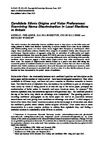Candidate Ethnic Origins and Voter Preferences: Examining Name Discrimination in Local Elections in Britain
| dc.contributor.author | Thrasher, M | |
| dc.contributor.author | Borisyuk, G | |
| dc.contributor.author | Rallings, C | |
| dc.contributor.author | Webber, R | |
| dc.date.accessioned | 2019-11-27T15:58:37Z | |
| dc.date.available | 2019-11-27T15:58:37Z | |
| dc.date.issued | 2017-04 | |
| dc.identifier.issn | 0007-1234 | |
| dc.identifier.issn | 1469-2112 | |
| dc.identifier.uri | http://hdl.handle.net/10026.1/15202 | |
| dc.description.abstract |
<jats:p>This article examines the relationship between candidate names as they appear on the ballot paper and voting patterns in British local elections. Specifically, it explores whether some voters favour candidates with British-sounding names over those whose names suggest either European or non-European ethnic origins. Name classification software identifies three categories of candidate: British, other European and non-European. Separate analyses of aggregate voting data are undertaken of multi-member and single-member electoral districts. Data cover the period 1973–2012, and votes for more than 400,000 candidates are examined. In multi-member districts, after comparing within-party slates and finishing order generally, candidates whose surnames suggest a British ethnic origin perform best, while non-Europeans attract fewer votes. The analysis of single-member districts focuses on a party’s vote share after taking into account the pattern of candidate recruitment across electoral cycles. It shows that vote share is adversely affected when British candidates are replaced by those with European and non-European surnames, while the opposite pattern of succession is associated with a boost in votes. It is clear that the outcome of some elections has been determined by the parties’ choice of candidates.</jats:p> | |
| dc.format.extent | 413-435 | |
| dc.language | en | |
| dc.language.iso | en | |
| dc.publisher | Cambridge University Press (CUP) | |
| dc.subject | 4408 Political Science | |
| dc.subject | 44 Human Society | |
| dc.title | Candidate Ethnic Origins and Voter Preferences: Examining Name Discrimination in Local Elections in Britain | |
| dc.type | journal-article | |
| dc.type | Conference Proceeding | |
| plymouth.issue | 2 | |
| plymouth.volume | 47 | |
| plymouth.publication-status | Published | |
| plymouth.journal | British Journal of Political Science | |
| dc.identifier.doi | 10.1017/s0007123415000125 | |
| plymouth.organisational-group | /Plymouth | |
| plymouth.organisational-group | /Plymouth/Faculty of Arts, Humanities and Business | |
| plymouth.organisational-group | /Plymouth/REF 2021 Researchers by UoA | |
| plymouth.organisational-group | /Plymouth/REF 2021 Researchers by UoA/UoA20 Social Work and Social Policy | |
| plymouth.organisational-group | /Plymouth/REF 2021 Researchers by UoA/UoA20 Social Work and Social Policy/UoA20 Social Work and Social Policy MANUAL | |
| plymouth.organisational-group | /Plymouth/Users by role | |
| dc.identifier.eissn | 1469-2112 | |
| dc.rights.embargoperiod | Not known | |
| rioxxterms.versionofrecord | 10.1017/s0007123415000125 | |
| rioxxterms.licenseref.uri | http://www.rioxx.net/licenses/all-rights-reserved | |
| rioxxterms.type | Journal Article/Review |


